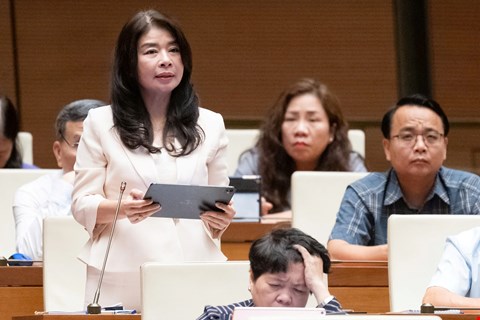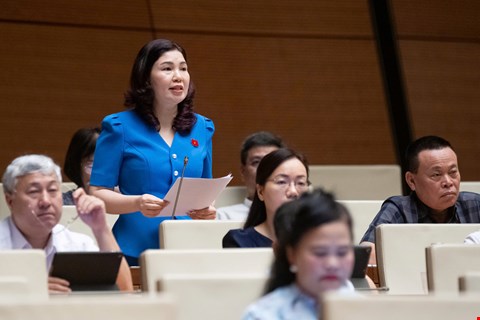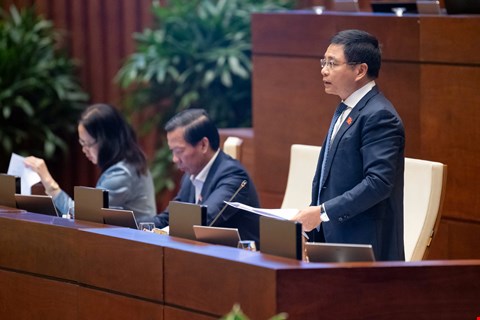Continuing the 9th Session, on the morning of May 16, the National Assembly discussed in the hall the draft Resolution of the National Assembly on mechanisms and policies for private economic development.
The majority of delegates said that private economic development cannot be just a slogan but must be institutionalized with specific legal corridors and policies, strong enough, long enough and of a breakthrough nature.
Using land synchronously but associated with business support policies
Speaking to contribute opinions on the draft Resolution, delegate Le Thu Ha - National Assembly deputy of Lao Cai province said that it is necessary to establish a synchronous land use strategy but associated with a policy to support businesses.
According to the delegate, land support policies need to be transparent and flexible to create breakthroughs for businesses, especially small, flexible and innovative businesses - these are vulnerable forces in an unstable and unpredictable institutional environment.

From practice, delegate Le Thu Ha said that land policy must be based on three core principles.
First, it is necessary to synchronize with land use planning according to the Land Law, avoiding the situation of land being reserved but not being able to be used.
Second, it is necessary to publicize land information through the national database system, connected to digital infrastructure and the business registration system.
Third, it is necessary to clearly distinguish between incentives and conditional support, to avoid taking advantage of policies, especially in establishing land rental prices and public assets.
Land policy is not only a tool but must be considered a component of an effective and transparent public resource management institution, delegate Le Thu Ha emphasized.
Delegate Ha suggested that it is necessary to establish a shared digital platform, ensuring data connection between sectors such as natural resources, environment, finance, science and technology investment, real-time information updates to support policy allocation and supervision, clearly defining the role of the central government in building data standards and legal criteria, especially supporting high-tech enterprises and innovation that are being broken into many specialized laws.
Tax must become a "companion" for businesses
Delegate Tran Thi Van - National Assembly Delegate of Bac Ninh province commented that compared to other incentive policies such as credit incentives, land access, human resource training, and administrative procedure reform, tax exemptions and reductions have a quick impact, without having to go through many procedures, helping businesses to start up, small and medium-sized enterprises overcome initial difficulties, improving competitiveness.
To make the tax exemption and reduction policy truly effective and suitable for practice, delegate Van proposed to increase the corporate income tax exemption period to 5 years and reduce it by 50% for the next 5 years instead of the short term as stipulated in the draft Resolution.
According to Ms. Van, the development cycle of creative startups often lasts from 5 to 7 years, many businesses do not make a profit in the initial stage, so the current short-term tax policy is not strong enough to promote investment and innovation.

In addition, the delegate proposed exempting personal income tax for 5 years for experts and scientists working in creative startup enterprises. This is an important group of forces, but also faces great income pressure when participating in a risky environment such as startups.
Speaking to receive the opinions of National Assembly deputies, Minister of Finance Nguyen Van Thang said that the tax policy is currently being built according to the principle of "nourishing revenue sources".
According to the Minister, in the short term, it may reduce budget revenue, but in the long term, it will help businesses have more financial space, contribute more and be more sustainable.
Regarding the regulation to abolish contract tax from January 1, 2026, the Minister said that this is the right direction, encouraging business households to convert to enterprises, creating a more fair and sustainable playground.

The Minister also said that the Ministry of Finance is directing the tax sector to increase the application of technology, reduce compliance costs, and support business households to register and declare more conveniently.
We will fully absorb the draft Resolution to complete it, ensuring its practicality, feasibility and consistency with current regulations, said Minister Nguyen Van Thang.









